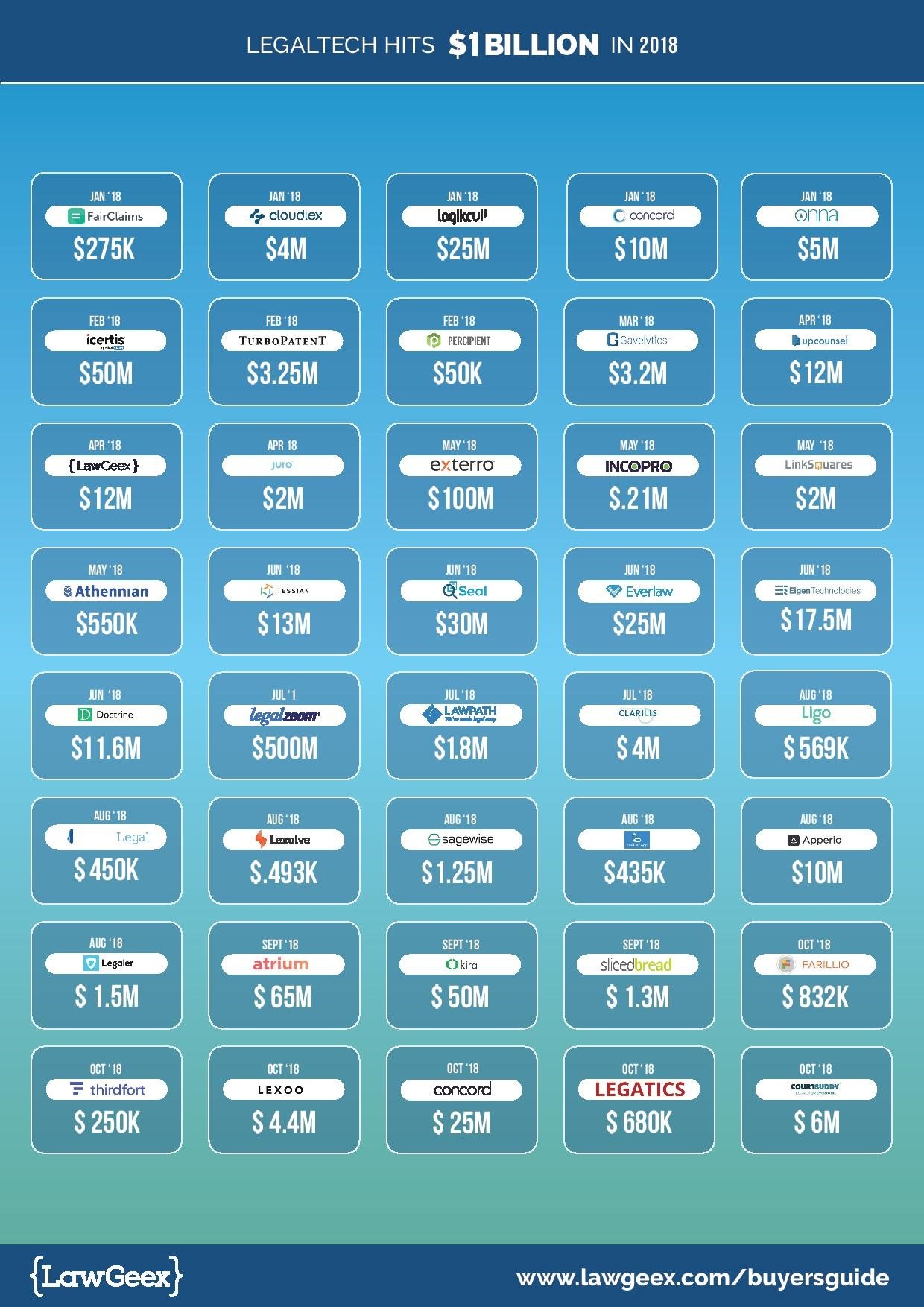
Investment into legal technology platforms has hit a record $1 billion in 2018 as investors rush headlong to transform the last bastion of manual processes — the work of lawyers.
The more than $1 billion is distributed over more than 40 deals, compared to $233 million in investments in legalTech companies across 61 deals in 2017.
AI in legal funding
Interestingly, $362 million of this funding has been invested in legal solutions utilizing AI. This AI-focused funding alone in 2018 represents a bigger sum than the investment across all legal technology in 2017.
Legal AI is transforming almost all daily legal tasks, from reviewing and approving documents to monitoring patents to find out your chances in front of a particular judge.
Investors are convinced AI will disrupt the profession. For example, TurboPatent raised $3.25 million this year, introducing new AI plays such as Invention Hub which tracks ideas from developers and engineers so that companies see where they are in the patent process. In contract review, LawGeex raised $12 million to help companies review and approve contracts fast and accurately in a process which can normally take weeks.
In prediction technology, judicial analytics platform Gavelytics closed a $3.2 million funding round for AI data extraction from court dockets to apply analytics that reveal insights about judges, such as how they might rule, and in what timeframe. Like many startups in the space, Gavelytics was founded by a former lawyer, Rick Merrill, a top litigator who became frustrated over his inability to get meaningful information about the judges before whom he appears. He says: “This is a ringing endorsement that a bunch of sophisticated investors believe in us.”
In legal services, one-year-old old law firm tech company, Atrium, founded by Justin Kan (the co-founder of live-video-streaming service, Twitch), received $50 million for a “full stack” legal service. Andrew Chen, General Partner at top VC Andreessen Horowitz, says of Atrium’s analysis of legal documents: “That’s really something in the last couple of years that’s become possible thanks to advances in AI.” He adds that “pain points like predictability, pricing, and quality of service remain sources of huge friction. How do you know how much a project will cost? What’s the state of your closing documents for your critical fundraising round? These are all problems that can be improved with software.”
Most recently, Canadian-based Blue J Legal, a legal research tool, raised $7 million at the end of November to roll out its AI solution helping tax professionals determine the strength of their tax position by applying AI to previous judicial decisions and finding cases by facts and outcomes.
Lawyers Response to the Revolution
Technology and rampant investment are not necessarily scaring the profession. Crunchbase News points out that the focus on AI-powered tools across industries are redefining work at a basic level. However, it points out “In any case, individuals in the legal field are probably happy to benefit from this trend.”
Lawyers remain surprisingly resilient despite the new technology landscape. In a study, carried out earlier this year with leading legal academics and experts, the LawGeex AI achieved an average 94% accuracy rate, higher than 20 top lawyers who achieved an average rate of 85%. It took the lawyers an average of 92 minutes to complete the NDA issue-spotting, compared to 26 seconds for the LawGeex AI. However, for these defeated lawyers there was no hand-wringing. There was almost no talk of the “rise of the machines” nor fear of AI taking their jobs. Most of the participants stressed that high-volume and low-risk contracts took up too much of their time, and felt it was incumbent on lawyers to automate work when, and where, possible
Meanwhile, 63% of paralegals admitted in a recent study that technology had replaced former manual tasks. However, an identical percentage said they could not perform their work without technology and 94% of paralegals describe their reliance on technology as “essential”.
Long road for Legal
Joining the $1 billion club is a massive milestone for legal technology. However, looking at other industries, “FinTech”, LegalTech’s richer and more successful older brother, has seen $41.7 billion invested so far in 2018. This was characterized by megadeals such as a $14 billion investment in Ant Financial, the payments affiliate of China’s Alibaba Group. Indeed drawing comparisons between the legal and financial world, Eden Shochat, a partner at Aleph VC (an investor in LawGeex) points out : “If you compare the legal industry to the tech investments made by the financial industry, you will understand the vast opportunity. JPMorgan’s 2017 revenue was $94 billion, and they spent an astounding $9.5 billion on technology. That is more than 10 percent of their revenue and over 10 times more spend on tech than the legal industry.”
Many other sectors have received far more investment – for instance, a recent report from CB Insights found that healthcare AI raised $4.3 billion across 576 funding rounds in the last five years. Doctors can claim to be even more immune than lawyers to automation given specialized training (lawyers claim that much of the work they do is too “special” for automation). However, both professions are undoubtedly waking up to the reality and opportunities for investment and the increased adoption of tech in every corner of their profession.
Legal Inflection Point
Though there is further to go to reach the heights of other sectors, an inflection point has arrived in the legal profession. Real cash from big-name investors has arrived as 2018 draws to a close. If every other sector’s trajectory is anything to go by, this is only the beginning. By this reckoning, funding will only continue to increase in 2019 and beyond.
If you are a General Counsel, check out the just-published (free) LawGeex eBook , with graphics interviews, and analysis on:
- The Anatomy of a General Counsel
- The Fortune 500 GC
- Gender and the GC
- GC Compensation across sectors, and skills
- The GC Reborn: The New Skills of the General Counsel


